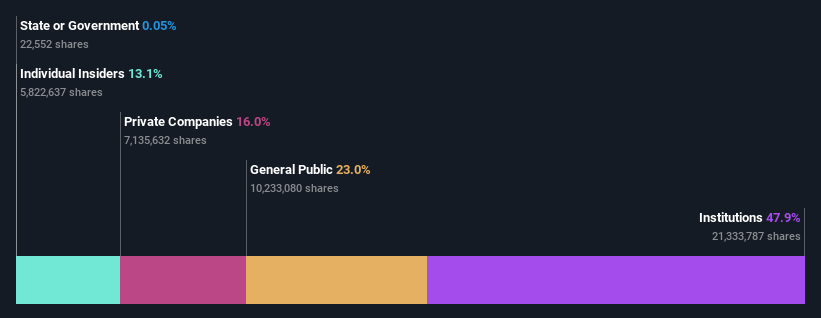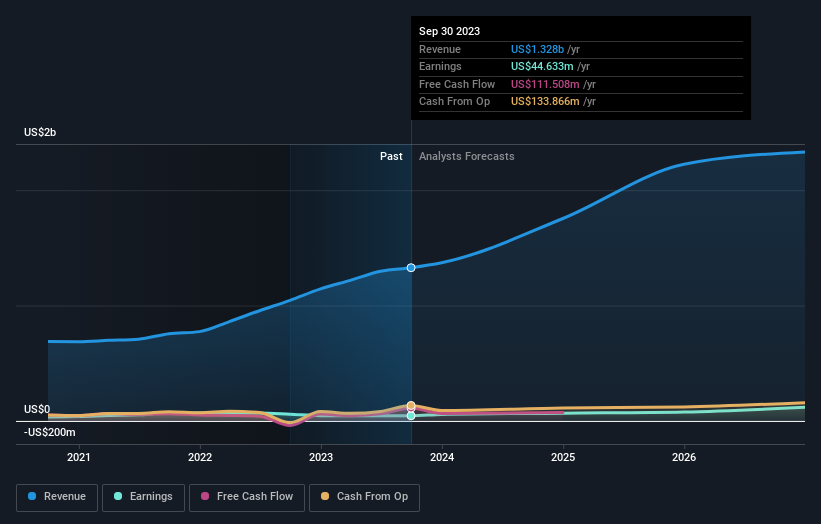An excellent week for Apollo Medical Holdings, Inc.'s (NASDAQ:AMEH) institutional owners who own 47% as one-year returns inch higher
Key Insights
Significantly high institutional ownership implies Apollo Medical Holdings' stock price is sensitive to their trading actions
52% of the business is held by the top 6 shareholders
If you want to know who really controls Apollo Medical Holdings, Inc. (NASDAQ:AMEH), then you'll have to look at the makeup of its share registry. We can see that institutions own the lion's share in the company with 47% ownership. Put another way, the group faces the maximum upside potential (or downside risk).
And last week, institutional investors ended up benefitting the most after the company hit US$1.7b in market cap. One-year return to shareholders is currently 4.3% and last week’s gain was the icing on the cake.
Let's delve deeper into each type of owner of Apollo Medical Holdings, beginning with the chart below.
See our latest analysis for Apollo Medical Holdings
What Does The Institutional Ownership Tell Us About Apollo Medical Holdings?
Institutional investors commonly compare their own returns to the returns of a commonly followed index. So they generally do consider buying larger companies that are included in the relevant benchmark index.
We can see that Apollo Medical Holdings does have institutional investors; and they hold a good portion of the company's stock. This implies the analysts working for those institutions have looked at the stock and they like it. But just like anyone else, they could be wrong. When multiple institutions own a stock, there's always a risk that they are in a 'crowded trade'. When such a trade goes wrong, multiple parties may compete to sell stock fast. This risk is higher in a company without a history of growth. You can see Apollo Medical Holdings' historic earnings and revenue below, but keep in mind there's always more to the story.
Apollo Medical Holdings is not owned by hedge funds. Allied Physicians of California IPA is currently the company's largest shareholder with 16% of shares outstanding. For context, the second largest shareholder holds about 15% of the shares outstanding, followed by an ownership of 11% by the third-largest shareholder. Additionally, the company's CEO Brandon Sim directly holds 3.5% of the total shares outstanding.
We also observed that the top 6 shareholders account for more than half of the share register, with a few smaller shareholders to balance the interests of the larger ones to a certain extent.
Researching institutional ownership is a good way to gauge and filter a stock's expected performance. The same can be achieved by studying analyst sentiments. There are plenty of analysts covering the stock, so it might be worth seeing what they are forecasting, too.
Insider Ownership Of Apollo Medical Holdings
The definition of an insider can differ slightly between different countries, but members of the board of directors always count. The company management answer to the board and the latter should represent the interests of shareholders. Notably, sometimes top-level managers are on the board themselves.
Most consider insider ownership a positive because it can indicate the board is well aligned with other shareholders. However, on some occasions too much power is concentrated within this group.
Our most recent data indicates that insiders own a reasonable proportion of Apollo Medical Holdings, Inc.. It has a market capitalization of just US$1.7b, and insiders have US$213m worth of shares in their own names. That's quite significant. Most would say this shows a good degree of alignment with shareholders, especially in a company of this size. You can click here to see if those insiders have been buying or selling.
General Public Ownership
With a 23% ownership, the general public, mostly comprising of individual investors, have some degree of sway over Apollo Medical Holdings. This size of ownership, while considerable, may not be enough to change company policy if the decision is not in sync with other large shareholders.
Private Company Ownership
We can see that Private Companies own 16%, of the shares on issue. It's hard to draw any conclusions from this fact alone, so its worth looking into who owns those private companies. Sometimes insiders or other related parties have an interest in shares in a public company through a separate private company.
Next Steps:
While it is well worth considering the different groups that own a company, there are other factors that are even more important. For instance, we've identified 1 warning sign for Apollo Medical Holdings that you should be aware of.
If you are like me, you may want to think about whether this company will grow or shrink. Luckily, you can check this free report showing analyst forecasts for its future.
NB: Figures in this article are calculated using data from the last twelve months, which refer to the 12-month period ending on the last date of the month the financial statement is dated. This may not be consistent with full year annual report figures.
Have feedback on this article? Concerned about the content? Get in touch with us directly. Alternatively, email editorial-team (at) simplywallst.com.
This article by Simply Wall St is general in nature. We provide commentary based on historical data and analyst forecasts only using an unbiased methodology and our articles are not intended to be financial advice. It does not constitute a recommendation to buy or sell any stock, and does not take account of your objectives, or your financial situation. We aim to bring you long-term focused analysis driven by fundamental data. Note that our analysis may not factor in the latest price-sensitive company announcements or qualitative material. Simply Wall St has no position in any stocks mentioned.


